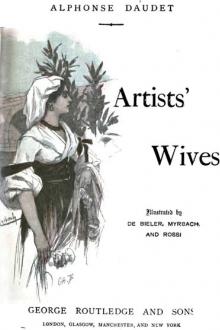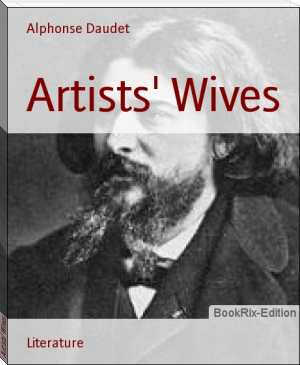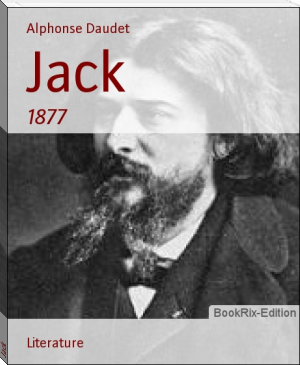Artists' Wives, Alphonse Daudet [best ebook reader android TXT] 📗

- Author: Alphonse Daudet
- Performer: -
Book online «Artists' Wives, Alphonse Daudet [best ebook reader android TXT] 📗». Author Alphonse Daudet
At the end of a month, she loved her husband, really loved him, not with the affection induced by habit, but with a real and true love. One day she wrote him a long letter full of passion and repentance. He did not vouchsafe a reply. Perhaps he thought she was not yet sufficiently punished. Then she despatched letter after letter, humbled herself, begged him to allow her to return, saying she would die rather than continue to live with that man. It was now the lover's turn to be called "that man." Strange to say, she hid herself from him to write; for she believed him still in love, and while imploring her husband's forgiveness, she feared the exaltation of her lover.
"He will never allow me to leave," she said to herself. Accordingly, when by dint of supplications she obtained forgiveness and the nurseryman—I have already mentioned that he was a philosopher,—consented to take her back, the return to her own home bore all the mysterious and dramatic aspect of flight. She literally eloped with her husband. It was her last culpable pleasure. One evening as the poet, tired of their dual existence, and proud of his regrown moustaches, had gone to an evening party to recite his Credo of Love, she jumped into a cab that was awaiting her at the end of the street and returned with her old husband to the little garden at Auteuil, for ever cured of her ambition to be the wife of a poet. It is true that this fellow was not much of a poet!
THE TRANSTEVERINA.
The play was just over, and while the crowd, with its many varied impressions, hurried away and poured out under the glare of the principal portico of the theatre, a few friends, of whom I was one, awaited the poet at the artists' entrance in order to congratulate him. His production had not, indeed, been very successful. Too powerful to suit the timid and trivial imagination of the public of our day, it was quite beyond the range of the stage, limited as that is by conventionalities and tolerated traditions. Pedantic criticism declared: "It is not fit for the stage!" and the scoffers of the boulevards revenged themselves for the emotion these magnificent verses had given them by repeating: "It won't pay!" As for us, we were proud of the friend who had dared to roll forth in a ringing peal, his splendid golden rhymes, flashing the best product of his genius beneath the artificial and murderous light of the lustres, and presenting his personages in life-like size, heedless of the optical illusion of the modern stage, of the dimness of opera-glass and defective vision.
Amid a motley crowd of scene shifters, firemen, and figurants muffled up in comforters, the poet approached us, his tall figure bent double, his coat collar chillily turned up over his thin beard and long grizzled hair. He seemed depressed. The scant applause of the hired claque and literary friends confined to a corner of the house foretold a limited number of representations, choice and rare spectators, and posters rapidly replaced without giving his name a chance of being known. When one has worked twenty of talent and life, this obstinate refusal of the public to comprehend is wearying and disheartening, and one ends by thinking: "Perhaps after all they are right." Fear paralyses and words fail. Our acclamations and enthusiastic greetings somewhat cheered him. "Really do you think so? Is it well done? 'Tis true I have given all I knew." And his feverish hands anxiously clutched ours, his eyes full of tears sought a sincere and reassuring glance. It was the imploring anguish of the sick person, asking the doctor: "It is not true, I'm not going to die?" No! poet, you will not die. The operettas and fairy pieces that have had hundreds of representations and thousands of spectators will be long since forgotten, scattered to the winds with their last playbills, while your work will ever remain fresh and living.
As we stood on the now deserted pavement, exhorting and cheering him, a loud contralto voice vulgarised by an Italian accent burst upon us.
"Hullo, artist! enough pouégie. Let's go and eat the estoufato!"
At the same moment a stout woman wrapped up in a hooded cape and a red tartan shawl linked her arm in that of our friend, in a manner so brutal and despotic that his countenance and attitude became at once embarrassed.
"My wife," he said, then turning towards her with a hesitating smile:
"Suppose we take them home and show them how you make an estoufato?"
Flattered in the conceit of her culinary accomplishments, the Italian graciously consented to receive us, and five or six of us started off for the heights of Montmartre where they dwelt, to share their stewed beef.
I confess I took a certain interest in the artist's home life. Since his marriage our friend had led a very secluded existence, almost always in the country; but what I knew of his life whetted my curiosity. Fifteen years before, when in all the freshness of a romantic imagination, he had met in the suburbs of Rome a magnificent creature with whom he immediately fell desperately in love. Maria Assunta, her father, and a brood of brothers and sisters inhabited one of those little houses of the Transtevera with walls uprising from the waters of the Tiber, and an old fishing boat rocking level with the door. One day he caught sight of the handsome Italian girl, with bare feet in the sand, red skirt tightly pleated around her, and unbleached linen sleeves tucked up to the shoulders, catching eels out of a large gleaming wet net. The silvery scales glistening through the meshes full of water, the golden river and scarlet petticoat, the beautiful black eyes deep and pensive, which seemed darkened in their musing by the surrounding sunlight struck the artist, perhaps even rather trivially, like some coloured print on the titlepage of a song in a music-seller's window.
It so chanced that the girl was heart-whole, having till now bestowed her affections on a big tom-cat, yellow and sly, also a great fisher of eels, who bristled up all over when anyone approached his mistress.
Beasts and men, our lover managed to tame all these folk, was married at Santa-Maria of the Transtevera and brought back to France the beautiful Assunta and her cato.
Ah! poor fellow, he ought also to have brought away at the same time some of the sunlight of that country, a scrap of the blue sky, the eccentric costume and the bulrushes of the Tiber, and the large swing nets of the Ponte Rotto; in fact the frame with the picture. Then he would have been spared the cruel disenchantment he experienced when, having settled in a modest flat on the fourth storey, on the heights of Montmartre, he saw his handsome Transteverina decked out in a crinoline, a flounced dress, and a Parisian bonnet, which, constantly out of balance on the top of her heavy braids, assumed the most independent attitudes. Under the clear cold light of Parisian skies, the unfortunate man soon perceived that his wife was a fool, an irretrievable fool. Not a single idea even lurked in the velvety depths of those beautiful black eyes, lost in infinite contemplation. They glittered like an animal's in the calm of digestion, or in a chance gleam of light, nothing more. Withal the lady was common, vulgar, accustomed to govern by a slap all the little world of her native hut, and the least opposition threw her into uncontrollable rages.
Who would have guessed that the fine mouth, straitened by silence into the purest shape of an antique face, would suddenly open to let flow torrents of vulgar abuse? Without respect for herself or for him, out loud, in the street, at the theatre, she would pick a quarrel with him, and indulge in scenes of fearful jealousy. To crown all, devoid of any artistic feeling, she was completely ignorant of her husband's profession and language, of manners, in fact of everything. The little French she could be taught, only made her forget Italian, and the result was that she composed a kind of half and half jargon which had the most comical effect. In short this love story, begun like one of Lamartine's poems, was ending like a novel of Champfleury's. After having for a long time struggled to civilise this wild woman, the poet saw he must abandon the task. Too honourable to leave her, probably still too much in love, he made up his mind to shut himself up, see no one, and work hard. The few intimate friends he admitted to his house, saw that they embarrassed him and ceased to come.
Hence it was that for the last fifteen years he had been living boxed up in his household like in a leper's cell.
As I pondered over this wretched existence, I watched the strange couple walking before me. He, slender, tall and round-shouldered.
She, squarely built, heavy, shaking her shawl by an impatient shrug of her shoulders, with a free gait like a man's. She was tolerably cheerful, her speech was loud, and from time to time she turned round to see if we followed, familiarly shouting and calling by name those of us she happened to know, accentuating her words by much gesticulation as she would have hailed a fishing boat on the Tiber. When we reached their house, the concierge, furious at seeing so noisy a crew at such an unearthly hour, tried to prevent our entry. The Italian and he had a fearful row on the staircase. We were all dotted about on the winding stairs dimly lighted by the dying gas, ill at ease, uncomfortable, hardly knowing if we ought not to come down again.
"Come, quick, let us go up," said the poet in a low tone, and we followed him silently, while, leaning over the banisters that shook under her weight and anger, the Italian let fly a volley of abuse in which Roman imprecations alternated with the vocabulary of the back slums. What a return home for the poet who had just roused the admiration of artistic Paris, and still retained in his fevered eyes the dazzling intoxication of his first performance! What a humiliating recall to every-day life!
It was only by the fireside in his little sitting room that the icy chill caused by this silly adventure was dispelled, and we should soon have completely forgotten it, had it not been for the piercing voice and bursts of laughter of the signora whom we heard in the kitchen telling her maid how soundly she had rated that choulato! When the table was laid and supper ready, she came and seated herself amongst us, having taken off her shawl, bonnet and veil, and I was able to examine her at my leisure. She was no longer handsome. The square face, the broad heavy jaw, the coarse hair turning grey, and above all the vulgar expression of the mouth, contrasted singularly with





Comments (0)